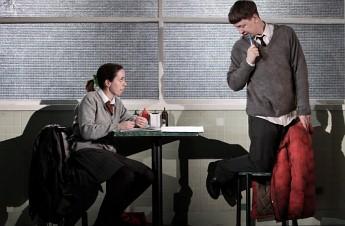Review - 'Port' at the National Theatre 2013
Set in Stockport, just southeast of the sprawling city of Manchester in the north of England, 'Port' describes the early life-journey of a girl, Racheal Keats and her younger brother Billy as they progress from childhood into early adulthood. The play is divided into 8 scenes which take us from 1988 to 2002. The latter year, coincidentally, is the same year in which the play premiered at the Royal Exchange, Manchester. That first production was directed by Marianne Elliott who also directs this revival. And both the director and writer, Simon Stephens, hail from the town which is the focus of this rather sad and depressing drama.
When we first meet them, Racheal is 11 and Billy is just six. We discover them and their mother sitting in an old car outside their home in Stockport. The three seem to have been locked out of their house by Racheal and Billy's father, who seems a difficult and violent type, described by Racheal as 'weird'. Though she is still in primary school, Racheal seems older and more perceptive than her years. She already has an inkling that her mother may leave home. And, by the time we next meet them in a hospital cafeteria, their mother has left the family and the town for good, and the two children are left in the dubious care of their father. In later scenes, we see Racheal making her first attempts at developing her own life away from home. We see her trying to borrow money for the deposit on a flat to secure her independence, her first tentative steps at developing relationships with boys and, later, the disintegration of her marriage. In the meantime, brother Billy turns to stealing and running wild, and inevitably falls foul of the authorities.
Most of the scenes feature just two or three actors, so the action seems almost lost in the considerable expanse of the Lyttleton stage. Rather than detracting from the intimacy of the piece, that accentuates the isolation of the characters in an environment which is as much a gloomy, concrete jungle than anything else.
Kate O'Flynn delivers an extraordinarily powerful, distinctive and moving performance as Racheal Keats. She moves naturally and, therefore, convincingly between the stages of her character's physical and emotional development, and is on-stage almost for the duration of the piece. Ms O'Flynn's Racheal does possess resilience and is a fighter. So, much so, that there are times when she seems to have more masculine traits than feminine. Even so, she finds the battle of facing daily life overpowering and marries a man exactly like her father (in fact he is played by the same actor, Jack Deam) because, as she explains, 'he asked her'. Ms Flynn has excellent support, especially from Mike Noble as Billy, Calum Callaghan as Danny, and Jack Deam as Racheal's violent father and equally violent and jealous husband, Kevin.
'Port' is described in the publicity material as 'a portrait of a town', but much of what transpires could happen in any town, particularly in the north of England, or, indeed, in may other parts of the UK, and possibly further afield. So, rather than being a portrait of a particular place, it's more a portrait of social and material deprivation and poverty, violence, the inability to cope with modern living, unworkable relationships, urban stress, dreams unfulfilled and much else besides. There is only the merest ray of hope at the end of a play which sometimes feels unremittingly bleak. Though the odd humorous line surfaces occasionally, the overall tone is grim and unforgiving as though all the odds are stacked against Racheal and her brother, as well as the wider community, leaving one with a real sense of hopelessness.
"George Orwell talked about the "good bad book" - the book that endures, despite being badly written - and in Port, revived now at the National 10 years after it premiered at the Royal Exchange in Manchester, I think Simon Stephens has produced a 'good bad play'. "
Dominic Cavendish for The Daily Telegraph
"Kate O'Flynn gives a terrific performance...O'Flynn and her seven acting colleagues strike a fine balance between occasional laughter, discomfort and even an exquisite emotional agony. "
Ian Shuttleworth for The Financial Times
"Gosh, it's gloomy.
Quentin Letts for The Daily Mail
"It's gritty, grubby and honest. And if its episodic form feels jagged, there's no denying Stephens's elegant command of rhythm and motifs.
Henry Hitchings for The Evening Standard
"Marianne Elliott's production is flawless.
Michael Billington for The Guardian
Originally published on
